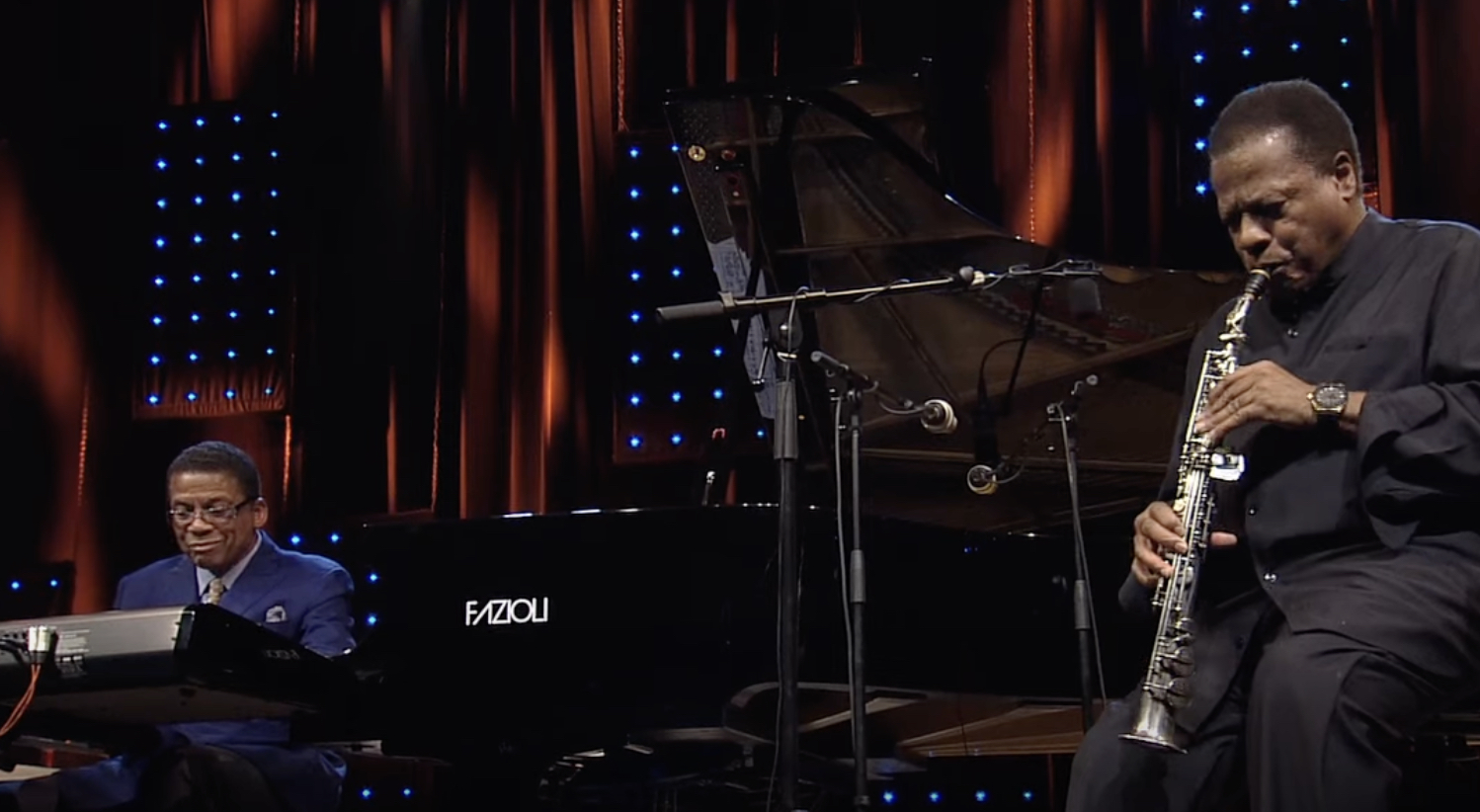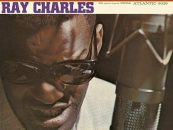Wayne Shorter, Saxophonist & Composer Who Co-Founded Weather Report, Dies
by Best Classic Bands Staff
Wayne Shorter (r) with Herbie Hancock in 2014
Wayne Shorter, the saxophonist and composer who played with such fellow jazz greats as Miles Davis and Art Blakey’s Jazz Messengers before going on to form the jazz fusion band Weather Report, died today (March 2, 2023). His death at age 89 at a Los Angeles hospital was confirmed by his publicist. As recently as 2016, he performed alongside Carlos Santana and Herbie Hancock in the supergroup Mega Nova, for a concert at the Hollywood Bowl.
Hancock, Shorter’s closest friend and collaborator for more than six decades, said “Wayne Shorter, my best friend, left us with courage in his heart, love and compassion for all, and a seeking spirit for the eternal future. He was ready for his rebirth. As it is with every human being, he is irreplaceable and was able to reach the pinnacle of excellence as a saxophonist, composer, orchestrator, and recently, composer of the masterful opera …Iphigenia. I miss being around him and his special Wayne-isms but I carry his spirit within my heart always.” Many other tributes appear below.
From his official biography on Blue Note Records’ website: Though some will argue about whether Wayne Shorter’s primary impact on jazz has been as a composer or as a saxophonist, hardly anyone will dispute his overall importance as one of jazz’s leading figures over a long span of time. Though indebted to a great extent to John Coltrane, with whom he practiced in the mid-’50s while still an undergraduate, Shorter eventually developed his own more succinct manner on tenor sax, retaining the tough tone quality and intensity and, in later years, adding an element of funk. On soprano, Shorter is almost another player entirely, his lovely tone shining like a light beam, his sensibilities attuned more to lyrical thoughts, his choice of notes becoming more spare as his career unfolded. Shorter’s influence as a player, stemming mainly from his achievements in the ’60s and ’70s, was tremendous upon the neo-bop brigade who emerged in the early ’80s, most notably Branford Marsalis. As a composer, he is best known for carefully conceived, complex, long-limbed, endlessly winding tunes, many of which have become jazz standards yet have spawned few imitators.
Shorter started on the clarinet at 16 but switched to tenor sax before entering New York University in 1952. After graduating with a BME in 1956, he played with Horace Silver for a short time until he was drafted into the Army for two years. Once out of the service, he joined Maynard Ferguson’s band, meeting Ferguson’s pianist Joe Zawinul in the process. The following year (1959), Shorter joined Art Blakey’s Jazz Messengers, where he remained until 1963, eventually becoming the band’s music director. During the Blakey period, Shorter also made his debut on records as a leader, cutting several albums for Chicago’s Vee-Jay label. After a few prior attempts to hire him away from Blakey, Miles Davis finally convinced Shorter to join his quintet in September 1964, thus completing the lineup of a group whose biggest impact would leapfrog a generation into the ’80s.
While still working alongside Davis, Shorter released several solo efforts on Blue Note that have long been considered classics of the genre, including Night Dreamer, Juju and Speak No Evil, all recorded in 1964
Staying with Davis until 1970, Shorter became the band’s most prolific composer at times, contributing tunes like “E.S.P.,” “Pinocchio,” “Nefertiti,” “Sanctuary,” “Footprints,” “Fall,” and the signature description of Davis, “Prince of Darkness.” While playing through Davis’ transition from loose post-bop acoustic jazz into electronic jazz-rock, Shorter also took up the soprano in late 1968, an instrument that turned out to be more suited to riding above the new electronic timbres than the tenor. As a prolific solo artist for Blue Note during this period, Shorter expanded his palette from hard bop almost into the atonal avant-garde, with fascinating excursions into jazz-rock territory toward the turn of the decade.
In 1970, Shorter teamed up with old cohort Joe Zawinul and Miroslav Vitous to form Weather Report, where after a fierce start, Shorter’s playing grew mellower, pithier, more consciously melodic, and gradually more subservient to Zawinul’s concepts. Their 1977 album, Heavy Weather, topped the Jazz sales chart and reached #30 on the overall U.S. album chart.
By now he was playing mostly on soprano, though the tenor would re-emerge more toward the end of Weather Report’s run. Shorter’s solo ambitions were mostly on hold during the band’s days. Shorter also revisited the past in the late ’70s by touring with Freddie Hubbard and ex-Miles sidemen Herbie Hancock, Ron Carter, and Tony Williams as V.S.O.P.
Shorter finally left Weather Report in 1985, but promptly went into a creative slump. Still committed to electronics and fusion, his recorded compositions from this point that became more predictable and labored, saddled with leaden rhythm sections and overly complicated arrangements. After three routine Columbia albums during 1986-1988, and a tour with Santana, he lapsed into silence, finally emerging in 1992 with Wallace Roney and the V.S.O.P. rhythm section in the “A Tribute to Miles” band. In 1994, now on Verve, Shorter released High Life, with keyboardist Rachel Z.
He guested on the Rolling Stones’ Bridges to Babylon in 1997, and on Herbie Hancock’s Gershwin’s World in 1998. In 2001, he was back with Hancock for Future 2 Future. He also contributed to Joni Mitchell’s live album Miles of Aisles and the 1977 studio set Don Juan’s Reckless Daughter, as well as Steely Dan’s Aja and Don Henley’s The End of the Innocence.
Though absent from recording, Shorter continued to tour regularly with the same quartet after 2005. They re-emerged on record again in 2013 with a live outing from their 2011 tour. Without a Net, his first recording for Blue Note in 43 years, was released that same year, as a precursor to his 80th birthday.
“Maestro Wayne Shorter was our hero, guru, and beautiful friend,” said Blue Note President Don Was. “His music possessed a spirit that came from somewhere way, way beyond and made this world a much better place. Likewise, his warmth and wisdom enriched the lives of everyone who knew him. Thankfully, the work he left behind will stay with us forever. Our hearts go out to Carolina and all who loved him.”
Watch Shorter perform alongside Herbie Hancock and Carlos Santana in 2016
An important cog in the ever turning wheel of universal humanism has passed through leaving all he touched better than it was before. He was and will always be: purveyor of pentatonic perfection; master of blues inflected melodies; hero of vertical and horizontal harmonic… pic.twitter.com/XOKbNe9K5M
— Wynton Marsalis (@wyntonmarsalis) March 2, 2023
Several days after he passed, Joni Mitchell wrote a tribute that included, “I love Wayne Shorter. He’s the best saxophonist ever, in my opinion. Miles thought so too. Even over Coltrane and the people who were much more famous than Wayne, really. Everything was magical about him.”
I’ve been tracking Wayne Shorter all my life. In my early teens, I played Art Blakey’s Mosaic LP (with Wayne) over and over again while I drummed.
RIP, ‘Gentle Giant’.-John Densmore#WayneShorter #Jazz #ArtBlakey #RIP pic.twitter.com/GNoWLTxxwM
— John Densmore (@JohnDensmore) March 3, 2023
The Great legendary
Wayne Shorter passed today.
He has given us such a treasure trove of recordings of his compositions and improvisations! I feel so blessed to have been able to share some amazing creative experiences with him. pic.twitter.com/gSo2CIw2Ao— Jack DeJohnette (@DeJohnetteMusic) March 2, 2023
I love Wayne Shorter with every fiber of my being. Saw him play 20 times, listened to him in every context I could. A spiritual, intellectual and viscerally transcendent giant. My hero forever. I aspire to be a fraction of the musician and human he was. Love for ever.
— Flea (@flea333) March 2, 2023
Related: Musicians we’ve lost in 2023







No Comments so far
Jump into a conversationNo Comments Yet!
You can be the one to start a conversation.